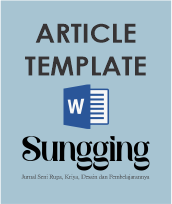Implementation of inter- and transdisciplinary concepts in art education at higher education
Implementasi konsep inter- dan transdisiplin dalam pendidikan seni rupa di perguruan tinggi
DOI:
https://doi.org/10.21831/sungging.v4i1.87532Keywords:
Pendidikan Seni Rupa, Art education, Interdisciplinary, Interdisiplin, Transdisiplin, Transdisciplinary, Kurikulum, Curriculum, Collaboration, KolaborasiAbstract
Contemporary visual arts education requires a holistic approach. This study examines the implementation of interdisciplinary and transdisciplinary approaches in visual arts education at a university in Yogyakarta. The research employs a qualitative phenomenological approach, conducted through in-depth interviews with lecturers. The findings show that these approaches have been applied sporadically, particularly in research-based projects and cross-disciplinary collaborations, but face challenges such as curriculum limitations, lecturer resistance, and students' low literacy. Strategies such as research mentoring, topic-based assignments, and the use of technology have been found to be effective. The study concludes that there is a need for the development of a flexible curriculum, lecturer training, and supporting infrastructure to optimise interdisciplinary and transdisciplinary approaches.
_______________________________________________________________________________
Pendidikan seni rupa kontemporer membutuhkan pendekatan holistik. Penelitian ini mengkaji penerapan pendekatan interdisiplin dan transdisiplin di Pendidikan Seni Rupa di salah satu perguruan tinggi di Yogyakarta. Metode penelitian menggunakan pendekatan kualitatif fenomenologi melalui wawancara mendalam dengan dosen. Hasil penelitian menunjukkan bahwa pendekatan ini telah diterapkan secara sporadis, terutama dalam proyek berbasis riset dan kolaborasi lintas bidang, namun menghadapi tantangan seperti keterbatasan kurikulum, resistensi dosen, dan minimnya literasi mahasiswa. Strategi seperti pendampingan riset, tugas berbasis topik kompleks, dan pemanfaatan teknologi dianggap efektif. Penelitian ini menyimpulkan perlunya pengembangan kurikulum fleksibel, pelatihan dosen, dan infrastruktur pendukung untuk mengoptimalkan pendekatan interdisiplin dan transdisiplin.
References
Batmang. (2016). Pendekatan transdisipliner (suatu alternatif pemecahan masalah pendidikan). Jurnal Al-Ta’dib, 9(2), 44–54.
Chen, S. (n.d.). Revolution of STEAM education: The Importance of interdisciplinary art education (STEAM) in elementary education.
Costantino, T. (2018). STEAM by another name: Transdisciplinary practice in art and design education. Arts Education Policy Review, 119(2), 100–106.
Klassen, R. G. (2018). Interdisciplinary education: A case study. European Journal Of Engineering Education, 43(6), 842–859.
Leonido, L., Pereira, A., Mendes, L., Rodrigues, J. B., & Morgado, E. M. G. (2023). Art education: Two decades of creation, evaluation and application of an interdisciplinary method of artistic literacy. Education Sciences, 13(6), 1–15.
Maswati, & Tobroni, T. (2024). Penerapan mono disipliner, interdisipliner, multi disipliner, dan transdisipliner dalam pendidikan agama Islam. ISTIQRA’, 1, 13–14.
Moleong, L. J. (2017). Metodologi penelitian kualitatif. PT Remaja Rosdakarya.
Mulyatiningsih, E. (2023). Metode penelitian dasar untuk penulisan tugas akhir di perguruan tinggi. Relasi Inti Media.
Nicolescu, B. (2014). Methodology of Transdisciplinarity. World Futures, 70(3–4), 186–199. https://doi.org/10.1080/02604027.2014.934631
Puspita, S. K., Wadiyo, & Wibawanto, W. (2023). Kajian interdisiplin: Telaah seni rupa dan tari melalui teori akulturasi dan teori motivasi pada tari Ronggeng Warak karya Tari Sekar Kemuning. Journal of Islamic Art and Architecture (JIAA), 1(2), 69–73.
Salmawati, S. (2024). Mengintegrasikan seni dan sains dalam strategi pembelajaran interdisipliner. 5(2).
Streubert, H., & Carpenter, D. (1995). Qualitative research in nursing: Advancing the humanistic imperative. Lippincott.
Sugiarto, E. (2015). Kajian interdisiplin dalam penelitian pendidikan seni rupa: Substansi kajian dan implikasi metodologis. Jurnal Imajinasi, 9(1), 25–30.
Van Baalen, W. M., De Groot, T., & Noordegraaf-Eelens, L. (2021). Higher education, the arts, and transdisciplinarity: A systematic review of the literature. Research in Education, 111(1), 24–25.
Wibowo, A. A., Prasetya, S. P., Prastiyono, H., & Ketut, P. (2024). Implementasi pendekatan interdisipliner dalam pembelajaran di sekolah menengah pertama: Studi kasus pada Mata Pelajaran IPS di SMP Miftahurrohman Gresik. Jurnal Dialektika Pendidikan IPS, 1–5.






